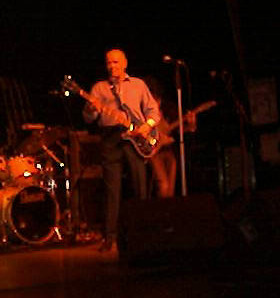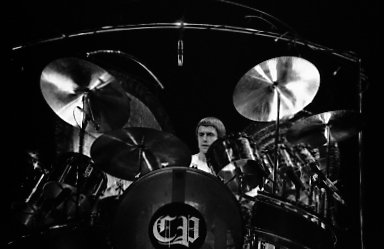|
Vivacitas
''Vivacitas'' (subtitled "Live at Glasgow 2002") is a live album recorded by the Nice, who reformed for a set of concerts, augmented by the Keith Emerson Band for the second half of the concert. David O'List, The Nice's original guitarist, did not take part, and was replaced by Dave Kilminster. The album consists of versions of pieces which had been live favourites during the Nice's heyday between 1967 and 1970, three piano solo pieces by Emerson, some pieces from the Emerson, Lake & Palmer repertoire performed by the Keith Emerson Band, and a 2001 interview with Emerson, Lee Jackson and Brian Davison by Chris Welch. Track listing Disc one #"America"/"Rondo" (Bernstein, Brubeck, Emerson) – 11:13 #"Little Arabella" (Emerson, Jackson) – 4:57 #"She Belongs to Me" ( Dylan, Emerson) – 6:21 #"The Cry of Eugene" (Emerson, Jackson, O'List) – 5:02 #"Hang on to a Dream" (Emerson, Hardin) – 10:30 #"Country Pie" (Bach, Dylan, Emerson) – 5:57 #"Karelia Suite" (Sibelius, Emers ... [...More Info...] [...Related Items...] OR: [Wikipedia] [Google] [Baidu] |
Brian Davison (drummer)
Brian Davison (25 May 1942 – 15 April 2008), was a British musician. He is best known for playing drums with The Mark Leeman Five, The Nice, Brian Davison's Every Which Way and Refugee. Biography Towards the end of the 1950s, he played in various skiffle groups in small clubs in the north-west of London. He quietly established a reputation as a drummer until the early 1960s when he joined The Mark Leeman Five in 1963, with Mark Leeman on vocals, Alan Roskams on guitar, Dave Hyde on bass and Terry Goldberg on piano. They recorded a series of singles during their career as well as an album published in 1963, ''Rhythm and Blues Plus!'', which contains among others, a song by Willie Dixon ''You can't judge a book by its cover'' and one from Mud Morganfeld ''Got my mojo working'', as well as other pieces from rhythm and blues. In 1965, after singer Mark Leeman died in a car accident, the band members recruited another singer Roger Peacock and the band continued until 1966 before ... [...More Info...] [...Related Items...] OR: [Wikipedia] [Google] [Baidu] |
The Nice
The Nice were an English progressive rock band active in the late 1960s. They blended rock, jazz and classical music and were keyboardist Keith Emerson's first commercially successful band. The group was formed in 1967 by Emerson, Lee Jackson, David O'List and Ian Hague to back soul singer P. P. Arnold. After replacing Hague with Brian Davison, the group set out on their own, quickly developing a strong live following. The group's stage performances featured Emerson's Hammond organ showmanship and abuse of the instrument. Their compositions included radical rearrangements of classical music themes and Bob Dylan songs. The band achieved commercial success with an instrumental rearrangement of Leonard Bernstein's "America", following which O'List left the group. The remaining members carried on as a trio, releasing several albums, before Emerson decided to leave the band in early 1970 in order to form Emerson, Lake & Palmer. The group briefly reformed in 2002 for a series o ... [...More Info...] [...Related Items...] OR: [Wikipedia] [Google] [Baidu] |
The Nice
The Nice were an English progressive rock band active in the late 1960s. They blended rock, jazz and classical music and were keyboardist Keith Emerson's first commercially successful band. The group was formed in 1967 by Emerson, Lee Jackson, David O'List and Ian Hague to back soul singer P. P. Arnold. After replacing Hague with Brian Davison, the group set out on their own, quickly developing a strong live following. The group's stage performances featured Emerson's Hammond organ showmanship and abuse of the instrument. Their compositions included radical rearrangements of classical music themes and Bob Dylan songs. The band achieved commercial success with an instrumental rearrangement of Leonard Bernstein's "America", following which O'List left the group. The remaining members carried on as a trio, releasing several albums, before Emerson decided to leave the band in early 1970 in order to form Emerson, Lake & Palmer. The group briefly reformed in 2002 for a series o ... [...More Info...] [...Related Items...] OR: [Wikipedia] [Google] [Baidu] |
Lee Jackson (bassist)
Lee Jackson (born 1944) is an English bass guitarist known for his work in the Nice, a progressive-rock band, as well as his own band formed after the Nice, Jackson Heights, and finally Refugee with Nice drummer Brian Davison and Swiss keyboardist Patrick Moraz. Biography He was born Keith Anthony Joseph Jackson in Newcastle upon Tyne. Jackson first played with unknown bands, The Vondykes and the Invaders. He then joined Gary Farr and the T-Bones, meeting their organist Keith Emerson. The two met again later, to form a backing band for American singer P. P. Arnold: she had been with the Ike & Tina Turner Revue, and was starting a solo career in England. The Nice were formed by Emerson and Jackson, with guitarist-trumpeter David O'List and Ian Hague on drums, soon to be replaced by Brian Davison. Emerson left the band to form Emerson, Lake & Palmer in 1970; Jackson subsequently formed the band Jackson Heights with Charlie Harcourt on guitars, Mario Enrique Covarrubias ... [...More Info...] [...Related Items...] OR: [Wikipedia] [Google] [Baidu] |
Dave Kilminster
David Kilminster (born 25 January 1962) is a British guitarist, vocalist, songwriter, producer and music teacher, who has toured as a sideman to several prestigious musicians, including progressive rock artists Steven Wilson and Roger Waters. Biography Dave Kilminster began playing piano in childhood, and later took up the guitar. During his youth he also sang in a barbershop quartet. In 1991 he won the 'Guitarist of the Year' award in a competition run by ''Guitarist Magazine'' with the instrumental song ''Sundance''; at that time he had a temporary job working on computers for IBM. Shortly after, Kilminster was asked to teach at the Guitar Institute in Acton. His job there also involved writing exam material and courses for Trinity College and Thames Valley University. Kilminster has taught at the Academy of Contemporary Music in Guildford and written for ''Guitar Techniques'' magazine. He has launched a series of instructional DVDs for Roadrock's Lick Library after the ... [...More Info...] [...Related Items...] OR: [Wikipedia] [Google] [Baidu] |
Greg Lake
Gregory Stuart Lake (10 November 1947 – 7 December 2016) was an English musician, singer, and songwriter. He gained prominence as a founding member of the progressive rock bands King Crimson and Emerson, Lake & Palmer (ELP). Born and brought up in Dorset, Lake began to play the guitar at the age of 12 and wrote his first song, " Lucky Man", at the same age. He became a full-time musician at 17, playing in several rock bands until his friend and fellow Dorset guitarist Robert Fripp invited him to join King Crimson as lead singer and bassist. They found commercial success with their influential debut album, ''In the Court of the Crimson King'' (1969). Lake left the band in 1970 and achieved significant success in the 1970s and beyond as the singer, guitarist, bassist, and producer of ELP. As a member of ELP, Lake wrote and recorded several popular songs including "Lucky Man" and " From the Beginning". Both songs entered the UK and US singles charts. Lake launched a solo c ... [...More Info...] [...Related Items...] OR: [Wikipedia] [Google] [Baidu] |
Aaron Copland
Aaron Copland (, ; November 14, 1900December 2, 1990) was an American composer, composition teacher, writer, and later a conductor of his own and other American music. Copland was referred to by his peers and critics as "the Dean of American Composers". The open, slowly changing harmonies in much of his music are typical of what many people consider to be the sound of American music, evoking the vast American landscape and pioneer spirit. He is best known for the works he wrote in the 1930s and 1940s in a deliberately accessible style often referred to as "populist" and which the composer labeled his "vernacular" style. Works in this vein include the ballets ''Appalachian Spring'', ''Billy the Kid'' and ''Rodeo'', his ''Fanfare for the Common Man'' and Third Symphony. In addition to his ballets and orchestral works, he produced music in many other genres, including chamber music, vocal works, opera and film scores. After some initial studies with composer Rubin Goldmark, Copland ... [...More Info...] [...Related Items...] OR: [Wikipedia] [Google] [Baidu] |
Carl Palmer
Carl Frederick Kendall Palmer (born 20 March 1950) is an English drummer best known as founding member and the last surviving member of the progressive rock supergroup Emerson, Lake & Palmer. He was also a founding member of progressive rock supergroup Asia. He has toured with his own bands since 2001, including Palmer, the Carl Palmer Band, and currently, Carl Palmer's ELP Legacy. He previously was a touring drummer for The Crazy World of Arthur Brown and a founding member of Atomic Rooster. Palmer was inducted into the ''Modern Drummer'' Hall of Fame in 1989, and was awarded the Prog God Award at the 2017 Progressive Music Awards. Career Early groups, Arthur Brown, and Atomic Rooster Palmer began taking drum lessons as a young boy. He took lessons with Britain's best-known classical percussionist of the twentieth century, James Blades, which undoubtedly contributed hugely to his masterful technique, sense of composition, and fluency across the entire gamut of percussion ... [...More Info...] [...Related Items...] OR: [Wikipedia] [Google] [Baidu] |
Honky Tonk Train Blues
"Honky Tonk Train Blues" is a song written by Meade Lux Lewis, and first recorded in 1927. A proto boogie-woogie song, it has many of the traits that would come to be identified with rock and roll. It is also the first recorded use of the term "honky-tonk" in a song. History The single, when first released, sold poorly, and Lux ended up working in a car wash for a living, but it was later heard by John Hammond, who found Lux and hired him to record the song again, initially releasing it in Europe. In 1937 he re-recorded it again, releasing the song in the US, where it was a hit, subsequently touring the country in a series of concerts that helped popularize boogie-woogie. Legacy It has gone on to be recorded in various contexts, often in a big band arrangement. Early recordings of the piece by artists other than Lewis include performances by Adrian Rollini, Frankie Trumbauer, classical harpsichordist Sylvia Marlowe, theater organist George Wright (with drummer Cozy Cole, under ... [...More Info...] [...Related Items...] OR: [Wikipedia] [Google] [Baidu] |
Meade Lux Lewis
Anderson Meade Lewis (September 4, 1905 – June 7, 1964), known as Meade Lux Lewis, was an American pianist and composer, remembered for his playing in the boogie-woogie style. His best-known work, "Honky Tonk Train Blues", has been recorded by many artists. Biography Anderson Meade Lewis was born in Chicago, though some sources state Louisville, Kentucky, on September 4, 1905 (September 3 and 13 have also been cited as his date of birth in sources). In his youth he was influenced by the pianist Jimmy Yancey. His father, a guitarist who made two recordings of his own, introduced Meade to music and arranged for him to have violin lessons. He gave up the violin at age 16, shortly after his father's death, and switched to the piano. The nickname "Lux" was given to him by his boyhood friends. He would imitate a couple of characters from a popular comic strip in Chicago, ''Alphonse and Gaston'', and stroke an imaginary beard as part of the routine. His friends started calling him th ... [...More Info...] [...Related Items...] OR: [Wikipedia] [Google] [Baidu] |
Jean Sibelius
Jean Sibelius ( ; ; born Johan Julius Christian Sibelius; 8 December 186520 September 1957) was a Finnish composer of the late Romantic and 20th-century classical music, early-modern periods. He is widely regarded as his country's greatest composer, and his music is often credited with having helped Finland develop a national identity during its Independence of Finland, struggle for independence from Russia. The core of his oeuvre is his Discography of Sibelius symphony cycles, set of seven symphonies, which, like his other major works, are regularly performed and recorded in Finland and countries around the world. His other best-known compositions are ''Finlandia'', the ''Karelia Suite'', ''Valse triste (Sibelius), Valse triste'', the Violin Concerto (Sibelius), Violin Concerto, the choral symphony ''Kullervo (Sibelius), Kullervo'', and ''The Swan of Tuonela'' (from the ''Lemminkäinen Suite''). His other works include pieces inspired by nature, Nordic mythology, and the Finni ... [...More Info...] [...Related Items...] OR: [Wikipedia] [Google] [Baidu] |
Keyboard Instrument
A keyboard instrument is a musical instrument played using a keyboard, a row of levers which are pressed by the fingers. The most common of these are the piano, organ, and various electronic keyboards, including synthesizers and digital pianos. Other keyboard instruments include celestas, which are struck idiophones operated by a keyboard, and carillons, which are usually housed in bell towers or belfries of churches or municipal buildings. Today, the term ''keyboard'' often refers to keyboard-style synthesizers. Under the fingers of a sensitive performer, the keyboard may also be used to control dynamics, phrasing, shading, articulation, and other elements of expression—depending on the design and inherent capabilities of the instrument. Another important use of the word ''keyboard'' is in historical musicology, where it means an instrument whose identity cannot be firmly established. Particularly in the 18th century, the harpsichord, the clavichord, and the early ... [...More Info...] [...Related Items...] OR: [Wikipedia] [Google] [Baidu] |





